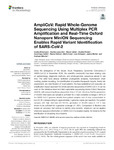AmpliCoV: Rapid Whole-Genome Sequencing Using Multiplex PCR Amplification and Real-Time Oxford Nanopore MinION Sequencing Enables Rapid Variant Identification of SARS-CoV-2
Brinkmann, Annika
Ulm, Sophie-Luisa
Uddin, Steven
Förster, Sophie
Seifert, Dominique
Oehme, Rainer
Corty, Merle
Schaade, Lars
Michel, Janine
Nitsche, Andreas
Since the emergence of the Severe Acute Respiratory Syndrome Coronavirus-2 (SARS-CoV-2) in December 2019, the scientific community has been sharing data on epidemiology, diagnostic methods, and whole-genomic sequences almost in real time. The latter have already facilitated phylogenetic analyses, transmission chain tracking, protein modeling, the identification of possible therapeutic targets, timely risk assessment, and identification of novel variants. We have established and evaluated an amplification-based approach for whole-genome sequencing of SARS-CoV-2. It can be used on the miniature-sized and field-deployable sequencing device Oxford Nanopore MinION, with sequencing library preparation time of 10 min. We show that the generation of 50,000 total reads per sample is sufficient for a near complete coverage (>90%) of the SARS-CoV-2 genome directly from patient samples even if virus concentration is low (Ct 35, corresponding to approximately 5 genome copies per reaction). For patient samples with high viral load (Ct 18–24), generation of 50,000 reads in 1–2 h was shown to be sufficient for a genome coverage of >90%. Comparison to Illumina data reveals an accuracy that suffices to identify virus mutants. AmpliCoV can be applied whenever sequence information on SARS-CoV-2 is required rapidly, for instance for the identification of circulating virus mutants.

